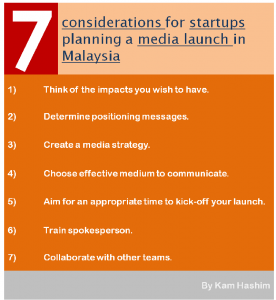A media launch can be an effective way to help you spread the word about your startup product or service. Handling a media launch though, can be a difficult task especially if you lack experience in the field. So, here, I’d like to focus on seven considerations for startups planning a media launch:
1) Think of the impacts you wish to have.
One of the first things you might want to do when thinking about a media launch is determine its direction. To get to this, think of the impacts that you wish to have from your campaign and from there, set up certain goals and specific objectives. By knowing what you want to achieve in a campaign you are able to focus. Doesn’t matter if you hire a PR firm or plan your own launch, you’ve got to know what to aim for and be realistic about it.
2) Determine positioning messages.
Avoid the mistake of rushing into telling your story to journalists without having a solid foundation of positioning. So before you go out and meet with journalists, determine your startup and product messages that will lead your communications with the media. Write down your positioning ideas and carefully review them with your trusted sources before you finalize everything. If you’re up against competition in the same space, journalists might be curious to know how you are different in the market. So be prepared to communicate your differentiation in your storytelling.
3) Create a media strategy.
The media landscape in Malaysia is quite diverse. You have to know which groups of media that would be appropriate for your launch. To achieve this, you have to determine target users and other groups of people important to your products and business. By sorting these out in the beginning, you will have a clear idea of which media of broadcast, online and print publications of different languages to contact. Then, if you’re personally handling the launch, start identifying individual editorial contacts appropriate for your kind of message. By the way, don’t forget to research local social media to identify possible practitioners you could pitch.
4) Choose effective medium to communicate.
Essentially, you’d need to think of what forms of communications to take place in your launch. Here’s something to consider: Say, if you’re releasing a new software, write up an official announcement of not more than two A4 pages complete with contact info for dissemination. Supplement the announcement with a whitepaper, research papers, marketing brochures, audio/visuals to explain your product/service, FAQs, corporate and market backgrounders, product images and so on and so forth.
If you’re handling the launch on your own, find out how the media would prefer to receive your information. For example, you should know what tools would be best to use to reach them — whether by email, telephone, facsimile or in-person meetings.
5) Aim for an appropriate time to kick-off your launch.
In general, product launches take place almost all year round. Before you setup a launch date, all things including internal and external factors should be consulted first. If you’re a software startup for example, make sure you sync up with your development team to know its progress so that you can mark a realistic launch date on the calendar.
Also, if you’re exhibiting at a tradeshow you could time your launch with the event. Nonetheless, you have an option of a virtual launch over the Internet through platforms such as your website and social media networks that are available 24/7.
6) Train spokesperson.
Startup entrepreneurs should not overlook the fact that communications skills are important to have. It is recommended to do a quick self-check on your skills or to seek advice from others if necessary.
7) Collaborate with other teams.
If your startup has a separate team handling product development and sales, make sure they are at least aware of what you’re doing in PR. It would be helpful if you could rope them in at some point or gain their input so you may integrate their ideas into your communications strategy. If you have someone else taking care of your website, make sure they will have a copy of your announcement and supporting materials to be posted online when the launch day comes.
Conclusion
Planning is as important as executing your campaign. There are various means of communications that you could leverage on to spread the word about your product/service. Let’s not forget that your commitment and dedication would be critical to the success of your media launch, among other factors.





